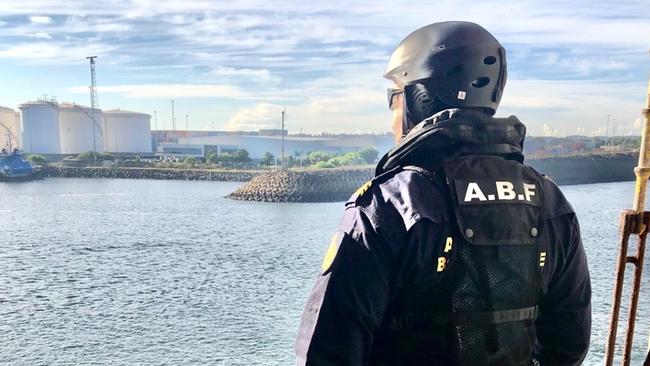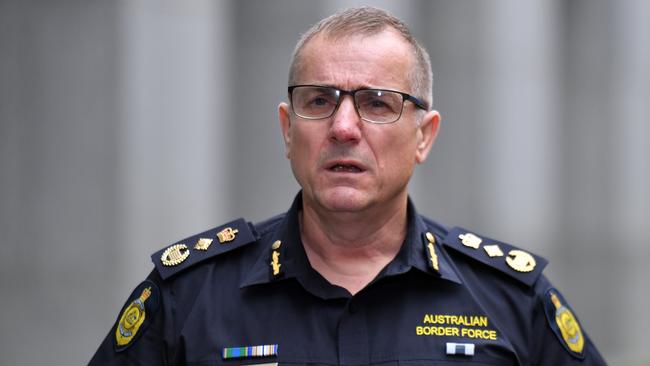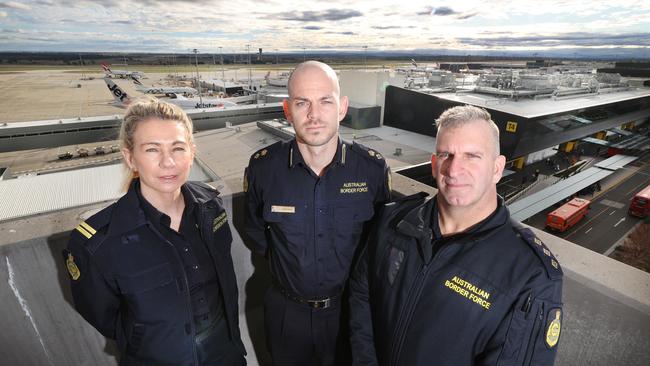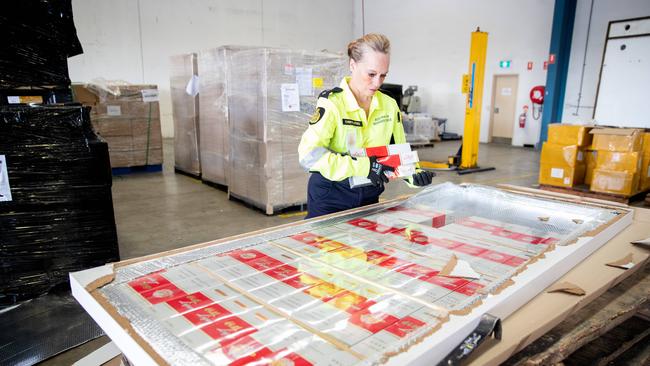Bikies under investigation for infiltrating Australian ports for drug smuggling
More than 100 people with suspected links to outlaw motorcycle gangs are being investigated for infiltrating Australia’s ports for drug trafficking. See how they do it.
True Crime
Don't miss out on the headlines from True Crime. Followed categories will be added to My News.
A member of the Mongols outlaw motorcycle gang has been busted after setting up a relative to act as a “door” to open the way for the trafficking of illegal drugs through strategic ports and on to Australian streets.
The bikie allegedly used the family member to establish a business and gain a licence to operate a legitimate Customs clearing house depot – which are considered “trusted traders” or “trusted insiders” in the border supply chain.
But it was exposed as a front for his drug smuggling operations.
Australian Border Force (ABF) officers attached to Operation Jardena smashed the racket and now have dozens more investigations underway into bikies and associates suspected of being trusted insiders for international drug smuggling syndicates.
They are suspected of working in a string of jobs including as airport baggage handlers and dockside workers at the nation’s biggest ports.

A News Corp investigation can reveal at least 14 people have been arrested in the past year for abusing their roles as “trusted insiders” or acting as “doors” for international drug trafficking operations.
And more than 500 people and business entities have been placed on a suspect control register by the ABF and are being monitored.
Of those about 100 are believed to have direct links to outlaw motorcycle gangs including the Rebels, Comanchero and Hell’s Angels.
ABF Commissioner Michael Outram said there is no organisation that is not susceptible to trusted insiders – including the Australian Border Force.
“My officers are susceptible as well,” Mr Outram said.

ABF Assistant Commissioner Phil Brezzo said sophisticated crime groups are trying everything possible to get their drugs or illegal cargo through customs.
“These are groups with long arms and are not necessarily Australian residents or citizens,” Mr Brezzo said.
“A large part of their set up is designed to accommodate that crossing of borders.”
Mr Brezzo warned there is ongoing active recruitment for trusted insiders often at – or during – innocent activities such as at the pub or footy games, and even kids’ parties.
“In some instances people are being targeted and groomed. In other instances they are fully conscious of what they are doing,” he said.
Mr Brezzo said the ABF has stepped up monitoring trusted insiders who may be able to give physical access to cargo shipments hidden in containers, in aircraft cargo and on the outside of ships.
“If you are going to take something out of the supply chain before it is customs cleared then it has to be an insider,” he said.

ABF Commissioner Mr Outram said valuable information gleaned from the ANOM sting last year has also given Border Force an edge on criminal activity and they are working closely with police to bring down the organised crime groups.
He said Operation Jardena (which has about 130 officers attached to it) is like “mission control” overseeing the big picture across the country.
He also said there is a global threat that needs to be addressed with more than 40 ports around the world, where authorities hold concerns they may have been infiltrated by criminal elements.
Mr Outram said drug smugglers never stop coming – using everything from yachts, to air and sea cargo.
“There are some companies that exist as doors to facilitate drugs … There are some international agents operating as insiders, and we are trying to find any bugs in the system,” he said.
Earlier this week, ABF officers busted an illegal shipment of more than seven million cigarettes at Sydney’s Port Botany in an operation likely to have been relying on a trusted insider to get the cargo around customs checks.

Other recent busts where trusted insiders have been suspected of involvement include the discovery of 15kg of cocaine found in reefer refrigerated in Tasmania in March. The drugs were hidden among other goods.
More than 400kg of cocaine was dropped overboard from a cargo vessel off the coast of South Australia in March. The drugs were found in an ocean search by ABF officers and foreign four crew members were charged.
In May, a dead Brazilian scuba diver was found near more than 50 kilograms of cocaine which is suspected of being smuggled into Newcastle Harbour attached to a container ship.
Former AFP Deputy Commissioner John Lawler has been brought in to undertake a wide-ranging operational security review of all ABF’s container examination facilities – where goods are Customs cleared.
It is aimed at determining what insider threat risks exist in the facilities, and in any supply chain or organisational connections.
The review includes analysis of current risk controls, examination of direct operations, physical and personnel security and will make recommendations for any new and enhanced controls to fight the trusted insider threat risk.





